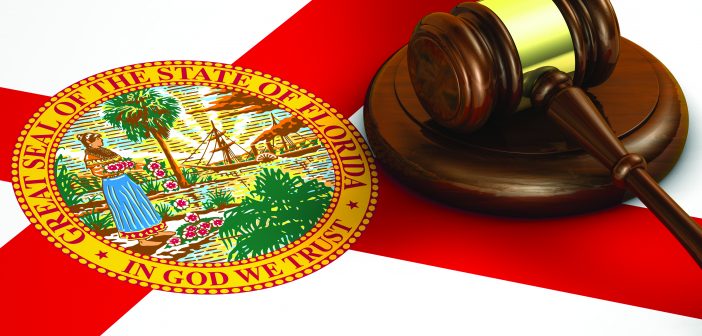Pre-Reveal Games
Entertainment or Gambling?

Legal columnist Tom Fricke
by Tom Fricke
We all know the catechism: No chance, no gamble. Right? Well… On Tuesday, July 17, in the middle of the morning, along (I’m sure) with a fair number of “tradesters,” I was watching television. It was a different kind of As the World Turns soap opera. It was oral argument before the Florida First District Court of Appeal in the matter of Gator Coin II, Inc. & Blue Sky Games, LLC v. Florida Dept. of Business and Professional Regulation, Div. Of Alcoholic Beverages and Tobacco. Those watching could see the law that governs the business of video redemption taking shape right before their eyes. (In this case, we’re not talking Fishbowl Frenzy or other games of that ilk, but the type that features gaming-style play.)
Last year, the Florida trial court had adjudicated the petition of Gator Coin (a distributor) and Blue Sky Games (the manufacturer that intervened) for a declaratory judgment about the compliance of a single-play pre-reveal game machine product, under a set of statutes that prohibit as gambling a concurrence of payment, prize and chance.
What if the player knows the outcome of one play (and one play only)? That was the issue before the trial court.
In one way or another, all courts define “chance” in the same way as the common dictionary: “the absence of any cause of events that can be predicted, understood or controlled.” Okay, so what if the game displays whether your next outcome will be 0¢ or $82.77 and when you make the play you get what’s predicted? You may ask (in the vernacular) “where’s the beef?”
That was what the Florida trial court had to decide. You could play the game before the court, knowing when you paid for one play, what the prize outcome of that one play would be. That’s all you could find out at any given time. Oh, by the way, the game in this case was a slot machine mimic. The trial court decided that chance influences winner determination in the game before it. Why?
In the trial court’s order there was an explanation of what convinced it. Here’s the gist of what the trial court said:
“The preview feature only displays outcomes that have been previously determined by [the random number generator]; at all times prior to the outcome being selected and consequently displayed, the outcome is unknown and unpredictable to the player. Additionally, the player cannot play game 2 or learn its outcome until game 1 is completed.•••
“People play losing games in hopes of winning ‘the next time or the next time or the next time.’ •••
“Because each game unlocks the opportunity to play subsequent games or outcomes of which outcomes are unknowable at the time the first game is played, and because such subsequent games offer the user an opportunity to receive something of value, the machines are slot machines within the meaning of section 849.16, Florida Statutes. •••
“••• [I]n order to have a chance to receive an outcome other than what is currently displayed by the preview feature, the player must commit money to the machine to be privy to the next preview. This play pattern has been recognized, in cases provided to the Court by Amici, as an illegal gambling scheme designed to circumvent gambling prohibitions.”
When the losing party appeals a trial court’s decision, the entire trial court record is sent to the appeals court, together with the written arguments of the trial parties’ lawyers about why the trial court was wrong or wasn’t wrong. The appellate judges go through all of that. Then they bring in the trial parties’ lawyers for a Q&A session. That’s what we watched: an hour or so of polite debate.
Oral argument is not a trial. The appellate judges ask questions of counsel, to be sure. Neither the questions nor the responses of counsel can be taken as indicative of the Court’s ultimate decision. The judges reviewed or will review the trial court’s opinion, the trial record (including any amicus curiae brief), the briefs of counsel, the law (statute, jurisprudence and persuasive authorities) cited in those documents and the law considered as a result of the Court’s own research. Questions on oral argument are for the judges to learn what counsel has to say on the point. They are not asked because the judges don’t know the correct answers. Responses by counsel are not determinative. The most telling of the judges’ questions was directed to the lawyer for Gator Coin/Blue Sky: “Come on. Are we required to throw away our common sense?”
At this point I have to point out that the lawyer’s job is to be the client’s zealous advocate, but only within the law. The lawyer’s job includes predicting the dispositions of courts, regardless of the outcome that the lawyer or client would prefer. My preferences as to the outcome of this Florida litigation and the conclusions of the Court have nothing to do with how I have to evaluate the oral argument that I watched or the other parts of the process that the First District Court of Appeal is in the middle of.
Some old sayings about the law prove out time and again in the real-world behavior of courts. One of them is that the law does not tolerate subterfuges or evasions. The most colorful statement of this principle came from an Ohio appeals court that was deciding whether there was enough evidence before the trial court to prove that an instant-win video sweepstakes business was not really in operation to sell “internet time.” The Court put it this way:
“Analyzing the ‘predominate purpose’ of the transaction has been criticized by some courts and commentators as inappropriate in the criminal context, but the justice system is not some lumbering oaf who must ignore the patently obvious gambling scheme apparent here simply because of a contrived separation between consideration and the scheme of chance.”
I marvel at how many lawyers I have encountered who believe that single-play pre-reveal is something new, innovative, cutting edge and valid as a compliance theory. It’s not. Slot machines date from their invention in San Francisco in 1887. (The traditional handle in a slot machine is there because the early ones were powered by spring compression.) By 1910, slot machines were so popular that (according to one commentator) “they could be found in every city and nearly every hamlet in the country.”
The familiar cycle of prohibition by new statutes and evasion by morphing of the target of prohibition promptly followed the initial proliferation of slot machines. One of the “morphs” was that when you pull the handle, the random number generator produces an outcome not for the play you start but for the one that will immediately follow the play you start. Before you coin the machine for the play you start, the random number generator had already determined that outcome and the machine had displayed it for you. Clever.
The first time this evasion came before an appellate court was in 1912 in both New York and Indiana. The decisions of those courts were that the machines before the courts were gambling devices. The single-play-preview morph spread across the country as rapidly as the initial deployment of the first slot machine. So did responsive prohibition laws, so did challenges and so did the decisions of state appellate and supreme courts.
By 1929 the appellate and supreme courts of 20 states had shot down the compliance theory of single-play pre-reveal. Not one had upheld single-play preview as a valid basis of compliance in a machine-delivered game for a prize. You could say that “20 appellate courts can’t be wrong.”
I say that the courts’ logic is strong. When you review those opinions, you find that the logic that the courts applied, hough expressed in a variety of ways, was identical: (1) substance over form and (2) subterfuge. I call that a national consensus of the courts. Strong.
What is surprising to me is that the lawyers for Gator Coin and Blue Sky and the lawyers for the State of Florida never picked up on the strong national consensus of the courts in other states. It’s easy to find this persuasive authority. You just use as your search term on LEXIS/NEXIS or Westlaw (all lawyers use these research databases) “next” within one word of “play.” It takes two minutes.
It took the Seminoles to do that homework and to bring the national consensus to the Florida courts’ attention.
Why the Seminoles? That tribe has an agreement with Florida for semi-exclusive rights to Florida slot machine gaming. The Tribe pays dearly for its exclusive, as an “exclusivity fee.” If a court opinion allows an expansion of “casino-style” gambling, then the Tribe doesn’t have to pay at all. Billions are at stake here.
Obviously the Tribe disfavors subterfuge slot machine mimics in every city and in almost every hamlet in Florida. Accordingly, the Tribe did its homework and in an amicus curiae brief, “told on” Blue Sky and Gator Coin about the national consensus.
But no Florida court had joined this consensus. Single-play pre-reveal was not yet Florida law, either “yes” or “no.” The dispute over it in Florida was (in lawyer talk) “first impression.” Here you can take no comfort about first impression in Florida. All the time, courts look to other states’ on-point precedent when confronted with facts of first impression, and so it is and will be for the demise of single-play pre-reveal in Florida. I guess you can see what my expectation is as to the outcome of Gator Coin’s appeal.
Take heart, though. Trial courts will generally follow the teachings of their states’ appellate courts. But what are those teachings in the case of Gator Coin and Blue Sky? Though many will misstate and misapply the force of the precedent that the Florida First District Court of Appeal will establish, that precedent goes no further than the facts upon which it was established: single play. Would the same principle apply to a two-play preview? Could it be said of a two-thousand-play preview that the player who pays for game one is actually placing a wager on game 2,001?
Oh, another principle that will be established by the outcome of the Gator Coin/Blue Sky litigation (I predict) is that evaluation of compliance under a gambling prohibition of a paid-for game for a prize will not be blind to the reality of how the public actually uses the machine.
This part of the industry knows how to morph. Watch this space.
Attorney Tom Fricke specializes in the law of redemption. He has served the amusement game trade for more than three decades in various roles including in-house counsel for a national FEC chain, trial and transactional attorney for many businesses and as an expert witness on the law of redemption. Tom has also penned hundreds of articles on the subject of redemption regulation, legislation and compliance.
Redemption and the Law is commentary. It is not legal advice. It is intended only to provide useful information on the subject matter covered with the understanding that neither the publisher nor the author is engaged in rendering legal services. If legal advice or other professional or expert assistance is required, the services of a competent professional should be sought. The views expressed in Redemption and the Law are solely those of the author and not the publisher. Author Tom Fricke claims an exclusive trademark in the phrase Redemption and the Law. He can be reached by email at [email protected]; phone 314/322-9526. © Copyright, Thomas F. Fricke 2016, St. Louis, Missouri, USA. All rights reserved worldwide.




